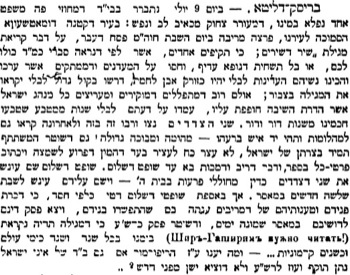The following passage is in Hamelitz, Issue #158, page 1677, 1 August 1888:
Brisk D'Lita: Reporter Moshe Kuperman reports about a trial that took place on the 9th of July in the regional court. He describes this trial as "a laughable but also painful" event:
In the small town Domatshevo, close to our town, a quarrel broke on the Sabbath of last Passover time, over reading the megillah of Song of Songs. Some men who were worried about the sweets and delicatessen prepared by their wives, demanded that the reading of the megillah would not take place in public. Most of the congregation, honoring their ancestors' customs, resented this demand. The arguments developed into a physical brawl.
The policeman who is always there when there is trouble, could not stop this brawl. He reported this to the judge and the judge accused the two parties as instigators of riots in a holy place. He sentenced them to 3 months in prison. However, at the meeting of the judges they saw that the parties had reached some compromise and therefore they reduced the length of imprisonment to 8 days.
The policeman decreed, by God's will, that the megillah be read every year as is the custom from days past. The reporter raises the question: What will the reformers say, now that a non-Jewish court corroborated [validated] God's will that you don't replace an old custom with a new one?
[Signed:] Moshe Kuperman


